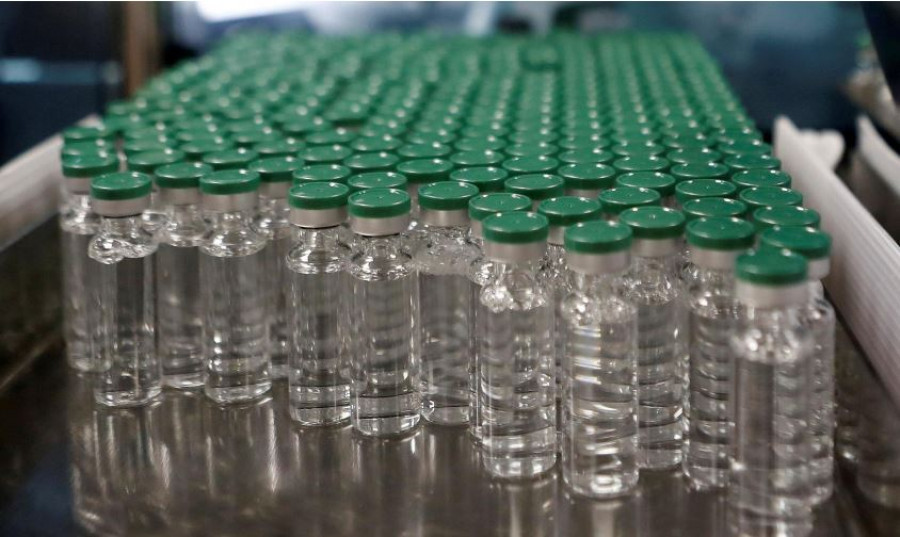Health
Oxford-AstraZeneca jab gets emergency use nod
Government should fulfil its promise to inoculate all eligible citizens, only allow private players to import if authorities can’t do so, experts say.
Arjun Poudel
Nepal’s drug regulator on Friday granted emergency use approval to the Covid-19 vaccine developed by the University of Oxford and pharmaceutical giant AstraZeneca and manufactured in India, paving the way for even private companies to import and sell the jab in the market.
Public health experts, however, say the government, which has already committed to vaccinating the entire population for free, should live up to its promise. Private companies should be also allowed to import the coronavirus vaccines, only if the government fails to import sufficient doses.
“The government has said it is committed to vaccinating eligible citizens free of cost,” Dr Bhagwan Koirala, chairman of Nepal Medical Council, the national regulatory body of medical doctors, told the Post. “The government should fulfill its promise and vaccinate 20 percent of the population which is at the highest risk—the frontline workers, the elderly people and with underlying conditions, at the earliest. ”
The Department of Drug Administration’s decided to grant emergency use authorisation to the Covishield vaccine manufactured by the Pune-based Serum Institute of India, on Friday, two days after it issued a notice calling on manufacturers of vaccines listed by the World Health Organization or their authorised agents to apply for emergency use authorisation at the earliest.
“If the government fails to procure the vaccine and people want to take the jab by paying on their own, we should only then discuss, whether or not to allow private imports of vaccines,” Koirala added. “If we allow private companies to import vaccines at the earliest, risk of infection will increase for frontline workers, elderly people, and the poor will not get the vaccines.”
At least three vaccine manufacturers—two of them Indian and one Chinese— responded to the call and applied for emergency use approval in Nepal, according to Bhattarai. While Serum Institute’s application was approved on Friday, applications from the Hyderabad-based Bharat Biotech and the Beijing-based Sinopharm are being reviewed.
“With the emergency use approval, suppliers and manufacturers can now administer the Covishield vaccine in Nepal without any restrictions,” Santosh KC, spokesperson for the department, told the Post. “The government too can import the vaccine by signing deals with the manufacturing companies or countries.”
Dr Prabhat Adhikari, infectious disease and critical care expert, echoed Koirala. “It will be better if the government secures vaccines for all citizens and administers it as per its priority list,” he told the Post. He also said that private players should be allowed to import the vaccine only if the government fails to do so. “If the government can’t procure enough doses, private importers should be allowed to sell the vaccine as it will ultimately help to fight the infection.”
Friday’s announcement came as Foreign Minister Pradeep Gyawali co-chaired the meeting of the sixth Nepal-India Joint Commission. The government was hoping for a breakthrough in talks with India to procure Covid-19 vaccines being manufactured in India. But a concrete agreement could not materialise during the meeting.
Nepal seeks to procure vaccines to inoculate 12 million people in the first phase and India is the preferred source, according to Minister for Health and Population Hridayesh Tripathi.
Earlier, Nepal’s Ambassador to New Delhi Nilamber Acharya has held two rounds of talks with senior officials of the Pune-based Serum Institute of India and met senior officials of Bharat Biotech in order to speed up the vaccine procurement, according to officials.
The Cabinet meeting on November 9 had decided to procure coronavirus vaccines, which have received emergency approval and administer them to people free of cost on the basis of priority.
It has estimated that Rs48 billion would be required to inoculate 52 percent of the population. As children under 15 years of age, who constitute 28 percent of the population, can’t be immunised as vaccines haven’t been tested on them, only 72 percent of the Nepalis will need to be vaccinated. The World Health Organization’s COVAX programme will provide vaccines for 20 percent of the population for free.
The Ministry of Health and Population has prepared a priority list for coronavirus vaccines. All health workers serving either in state-run or private health facilities who are at high risk of catching the infection are the first priority.
Supporting staffers—drivers, cleaning staff of health facilities, security personnel deployed on the frontline and female community health volunteers are also on the priority list.
People above 55 years old are on second priority and those in the 40 t0 54 years age group third, according to the Child Health Section at the Family welfare Division under the Department of Health Services.




 8.79°C Kathmandu
8.79°C Kathmandu















